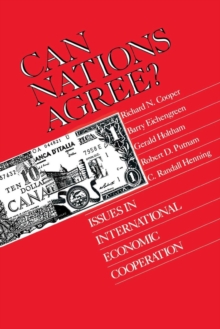
Quantifying the Impact of Technical Barriers to Trade : Can it be Done? Hardback
Edited by Keith E. Maskus, John S. Wilson
Part of the Studies in International Economics series
Hardback
Description
This book provides an up-to-date discussion of economic issues involved in analyzing regulations of product quality and performance in international trade.
Among the issues addressed in this collection are restrictions on genetically modified foods and pesticide use and compatibility standards for computers.
While such regulations may serve important goals, they may also interfere with international trade flow by raising the costs of compliance.
This is of special concern to developing countries, which have found it difficult to meet the increasingly exacting regulations imposed by the United States and Europe.
Keith E. Maskus and John S. Wilson gather prominent international trade specialists to ask whether the impacts of such regulations may be quantified systematically in order to inform the international policy debate.
The essays included here cover all fronts of the debate over regulatory issues and trade conflicts.
The discussion ranges from a review of how trade conflicts emerge and how they are managed by the international trading system to a technical analysis of the potential impact of European restraints on trade in genetically modified products to an examination of methods for estimating the costs of compliance with environmental regulations.
Considerable attention is paid to whether the emergence and enforcement of stronger standards among developed economies could result in diminished trade opportunities for developing countries.
At the same time, the possibility that standards could expand market access through resolving consumer information problems is analyzed.
This book will appeal to international economists, international relations specialists, and individuals concerned about appropriate regulation of safety and health issues in the global economy.
Keith E. Maskus is Professor of Economics, University of Colorado, Boulder.
John S. Wilson is Lead Economist, Development Economics Research Group, The World Bank.
Information
-
Available to Order - This title is available to order, with delivery expected within 2 weeks
- Format:Hardback
- Pages:264 pages, Illustrations
- Publisher:The University of Michigan Press
- Publication Date:30/11/2001
- Category:
- ISBN:9780472112470
Information
-
Available to Order - This title is available to order, with delivery expected within 2 weeks
- Format:Hardback
- Pages:264 pages, Illustrations
- Publisher:The University of Michigan Press
- Publication Date:30/11/2001
- Category:
- ISBN:9780472112470










